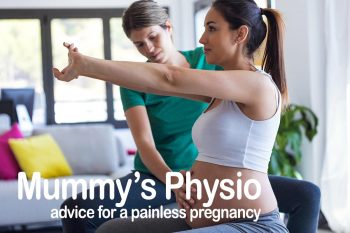Mummy Physio’s best advice for a painless pregnancy, for all mums to be!
In this article, we have asked the team at Mummy Physio her best advice for a painless pregnancy. They will explain how to achieve this, with physiotherapy and osteopathy.
The announcement of a pregnancy and the birth of a baby are indescribable moments of joy for mothers, but this prenatal and postnatal period is also a special time in a woman’s life with often significant physical and biological changes that can lead to pain or discomfort. This is completely normal and common to all women, and it is at this moment that pelvic health physiotherapists and women’s health osteopaths come into play to accompany you during these months to prevent or treat these various conditions. Taking care of these conditions will allow you to have a painless and smooth pregnancy and to avoid postnatal conditions that, if left untreated, could lead to discomfort in your everyday life. We will see below how specific modern women’s health physiotherapy techniques can treat each of these conditions to help you reach the ultimate wellness during your pregnancy and to recover your women’s body after you have given birth.
During Pregnancy
In this part we are going to look and the different conditions or discomfort that can appear during pregnancy and how a women’s health physio or osteopath can help to reduce them.
Lower back pain, sciatica, lumbago, and pelvic girdle pain.
These four terms actually refer to the same condition. Patients often present at the practice complaining of sciatica or lower back pain, which is actually caused by slight rotation of the pelvic bone triggering the sciatic nerve. This condition is known as pelvic girdle pain. This type of back pain is a very common complaint among pregnant women, and it can be attributed to various factors.
- The increase in uterine volume leads to a displacement of your center of gravity and thus a modification of pelvic statics. This explains the “false sciatica” experienced by pregnant women, which doesn’t stem from a spinal issue but rather from compression of the sciatic nerve at the level of the pelvic-trochanteric muscles.
- Weight gain due to pregnancy and the growth of the baby.
- Distension of the abdominal wall with loss of tone, leading to an imbalance in the pelvic area between abdominal and back muscles.
- History of lower back pain, which increases the risk.
In order to relieve pain and mechanical discomfort, the physiotherapist may propose both passive and active approaches for lower back pain treatment. Passive methods may include stretches, contract-relax techniques, manual therapy, and massages. Active approaches may involve specific postures and exercises for the individual to perform independently to alleviate pain and discomfort.
Osteopaths for women using specialised pregnancy techniques, also prove highly effective in relieving discomfort. They utilize gentle and soft osteopathic techniques on the spine and pelvic bone, often supplemented by manual stretching.
Heavy legs
Venous insufficiency is common during pregnancy, characterized by poor venous return due to a loss of elasticity and tone in the veins, along with valve dysfunction on the vein walls. Symptoms include heavy legs, worsened as the day progresses, tingling sensations, an irresistible urge to move the legs, nocturnal muscle cramps, edema (swelling of the calves, ankles, or feet), and the appearance of small varicose veins or spider veins on the legs.
In addition to wearing compression socks, stockings, or tights, Lymphatic Drainage offered in physiotherapy can be a valuable aid in relieving heavy legs. Lymphatic Drainage involves a smooth and superficial massage that activates the movement of lymphatic fluid from the legs to the nodes, alleviating the heavy sensation in the legs. This treatment not only improves lymph circulation but also provides moments of appreciated relaxation during pregnancy.
So, don’t let heavy legs bother your pregnancy experience when manual lymphatic drainage done by a physiotherapist can provide relief in just a few sessions.
Urinary incontinence, leaks, pelvic pain, and discomfort
It is common for pregnant women to experience urinary leaks, sometimes associated with pelvic pain, as early as the first trimester of pregnancy. Pelvic floor rehabilitation, conducted by a pelvic health physiotherapist, can be initiated during pregnancy to address these issues. The physiotherapist teaches the patient how to understand their pelvic floor and demonstrates effective exercises to prevent any type of incontinence. This rehabilitation is particularly beneficial as it also helps reduce the length of incontinence treatment after childbirth.
Physiotherapy Tip: Physical activity during pregnancy is a must for every woman.
Contrary to a common misconception, exercise is not prohibited during pregnancy; in fact, it is strongly recommended to adopt suitable activity from the first month until term, while observing contraindications and listening to one’s body.
- The beneficial effects of physical activity during pregnancy are numerous:
- Maintenance or improvement of the pregnant woman’s physical condition
- Prevention of excessive weight gain during pregnancy and assistance with postpartum weight loss
- Reduction of excessive birth weights
- Decrease in lower back and pelvic pain during pregnancy
- Reduction in the risk of urinary incontinence during pregnancy and postpartum
- Possible reduction in labor duration
- Prevention and improvement of postpartum depressive symptoms
Physiotherapists can support pregnant women in their sports practice by offering tailored exercises. For those who are already active, they can help harmonize their practice with their condition. Physical activity can also be done through activities like Pilates or with the assistance of a personal trainer.
After childbirth, the essential treatment is pelvic floor rehabilitation. Pelvic floor rehabilitation aims to educate women on understanding their pelvic floor, improve tone and vaginal sensitivity, prevent prolapse (or organ descent), and treat urinary incontinence. It can begin 6 weeks after childbirth to address any perineal issues, if present.
The most common postnatal treatments done by postnatal physiotherapists are incontinence treatment, prolapse physiotherapy, and diastasis recti treatment.
The first two will be treated with pelvic floor rehabilitation, while diastasis recti will be treated by a series of abdominal exercises aimed at reducing the gap between the abdominal muscles.
Diastasis is a separation of the superficial abdominal muscles (the rectus abdominis, commonly known as “six-pack muscles”). These muscles are joined at the level of the navel line, called the linea alba, by connective tissue. Abdominal separation occurs when this tissue stretches excessively, especially during pregnancy, affecting nearly half of women. Abdominal rehabilitation, which can also start as early as 6 weeks postnatal, is a simple rehabilitation that combines breathing techniques and specific abdominal exercises to train the tone of all the abdominal muscles in order to reduce the gap and avoid any bulging of the tummy.
The Ultimate Postnatal assessment
For women who just had a baby, all the different postnatal conditions can be confusing, which is why we advise every woman to do a full women’s health assessment with a women’s health physiotherapist. During this assessment, the physiotherapist will check your body from head to toe and detect any conditions you might have, proposing a tailored treatment plan. This full postnatal assessment will allow you to tackle these conditions faster, as the earlier they are taken care of, the fewer repercussions you will have on your body.
Finally, the physiotherapist can support the new mother in gradually resuming physical activity. Pilates is once again a very good way to return to more intense sports, and if you are worried, feel free to use a personal trainer specialized in postnatal women.
If you are pregnant, have recently given birth, and would like more information on how to be pain-free, or if you wish to book an appointment with some of the best women’s health physiotherapists in London, visit www.mummysphysio.com or give them a call on 02071250262. With their international team of physiotherapists and osteopaths specialized in women’s health, they will be able to assist you with whatever your needs may be.




